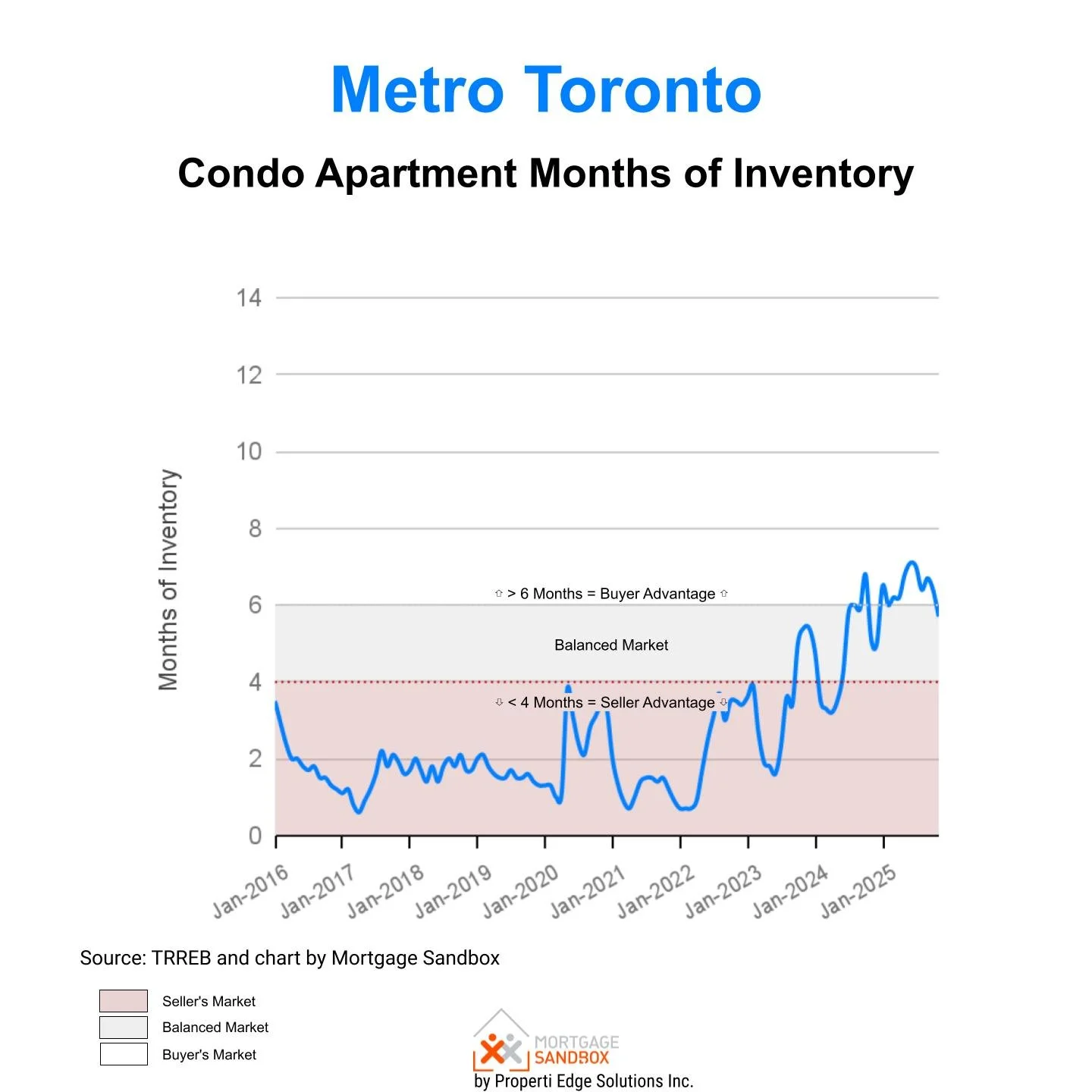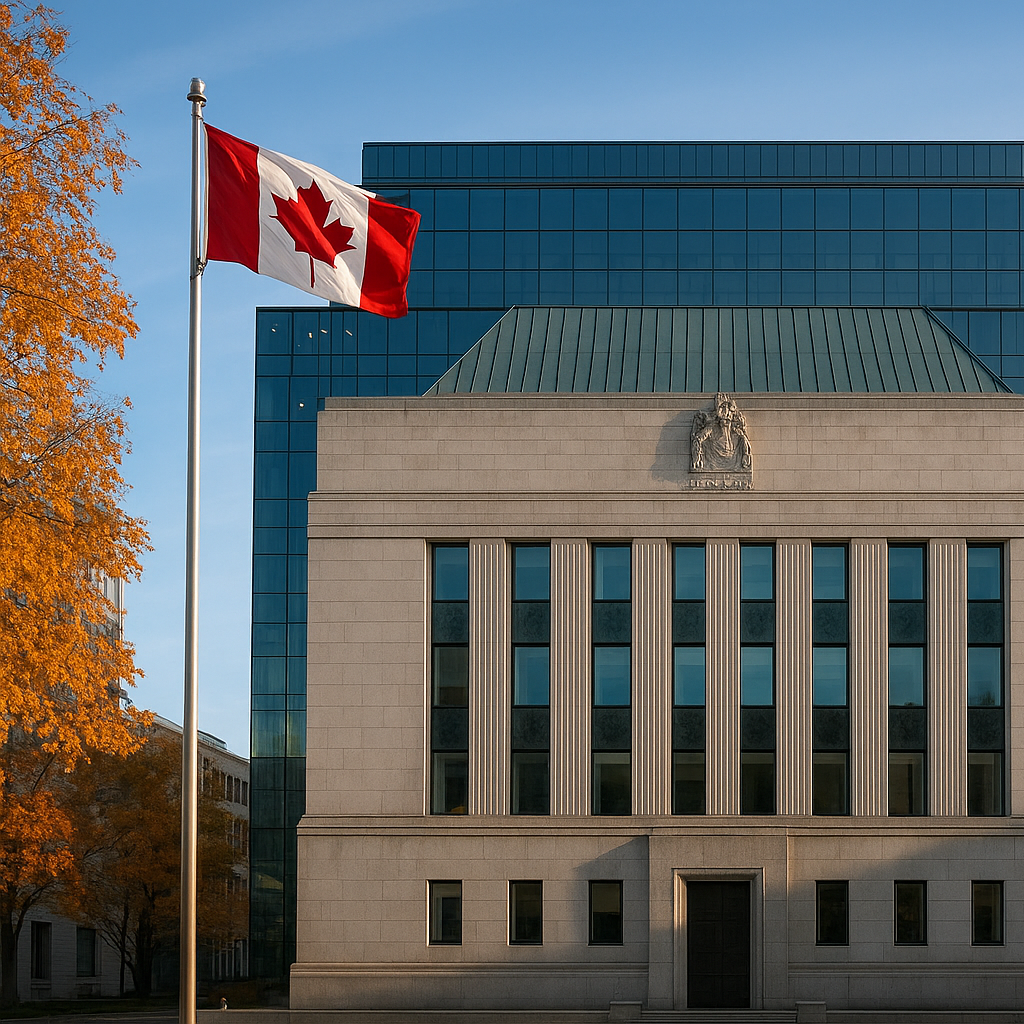Condo Markets Converge: Calgary, Toronto, Vancouver Show Different Conditions
A significant shift is underway in Canada's major housing markets as condominium apartment sectors in Calgary, Toronto, and Vancouver display distinct behaviours aligned to a national trend in favour of buyers. While all three markets favour buyers to varying degrees, underlying economic factors and local supply dynamics create strikingly different starting points for investors and homeowners, which have begun to converge over the course of 2025.
| Market | Benchmark Price | 3-year Price Change | Months of Inventory | Market Condition | Broad Trend |
|---|---|---|---|---|---|
| Greater Calgary | $318,200 | Up 14.5% (4.6% annualized) |
4.6 (Up 64% YoY) | Balanced Market | Trending in favour of buyers |
| Greater Toronto | $559,800 | Down 15.2% (-4.8% annualized) |
5.7 (Up 12% YoY) | Balanced Market | Trending in favour of buyers |
| Greater Vancouver | $718,900 | Down 2.7% (-0.9% annualized) |
6.4 (Up 42% YoY) | Buyer's Market | Trending in favour of buyers |
Calgary: Balanced but Softening
Calgary's condo market has transitioned from its previously hot conditions to a more balanced state, though it continues to show relative stability compared to larger cities. With benchmark prices at $318,200 as of October 2025, Calgary remains Canada's most affordable major urban market for condo apartments.
The market is experiencing cooling patterns: purchases & sales decreased by 26% year-over-year in October, while active listings grew by 19%. This has pushed months of inventory to 4.6 months, firmly establishing balanced conditions. Calgary's economic resilience, driven by the energy sector's strength and record production, provides underlying support despite the current softening.
The market price of Western Canadian Select (WCS) oil has decreased from nearly $70 to approximately $50 per barrel. For the five largest oil producers, the estimated full-cycle break-even price ranges between $41 and $43 per barrel. This narrowing profit margin has increased the risk of initiating new oil projects in Alberta over the past year.
Toronto: Re-adjustment Crisis Deepens
Toronto's condominium market is experiencing its most severe correction in decades, characterized by unprecedented inventory levels and developer distress. The Greater Toronto Area (GTA) saw 412 condo sales in October, down 26% from 2024, and the benchmark condo apartment price has dropped 6% year-over-year to $559,800. Down 26% from the peak.
Developers and some industry analysts argue that there is an extreme oversupply crisis in the market. According to Altus Group, the number of completed and unsold condominium units reached 1,699 in September 2025. Overall, unsold condo inventory across all stages of development totaled 15,875 units.
However, the current inventory of new builds is significantly lower than the levels observed from 2013 to 2015, a period during which prices were increasing, and the market was considered very active.
The condo apartment market is currently balanced, meaning that both buyers and sellers hold equal negotiating power. While inventory levels have improved for buyers, they have not reached what analysts would describe as crisis levels. A balanced market, as the term suggests, is quite normal. The months of inventory have increased from 5.1 to 5.7 compared to last year, representing a 12 percent rise.
Over the past decade, real estate agents and developers have become accustomed to operating in a market with extreme undersupply. As a result, they may mistake a normal supply for a supply crisis.
The freeze in new condo sales is likely due to pricing. Developers are asking for $1 million for a new condo, while homebuyers can purchase a well-maintained benchmark existing apartment for just $560,000.
Additionally, buyers have suddenly become aware of the risks associated with new-build homes. Understandably, pre-sale buyers are questioning the high premium they pay for a new build, especially considering the added risks compared to existing homes.
In other ways, the industry is adjusting to adapt to more normal market conditions. Renters and buyers complain that some new developments built “shoeboxes” that aren’t rentable or buyable. Some industry insiders claim developers began focusing exclusively on investor buyers, while ignoring what final occupants would find desirable in a home. If the building is complete and unsuited for the current market, there will be an understandable supply of unsold and unrented units.
"This is a perfect storm of investor exodus, assignment market collapse, and quality concerns over sub-600-square-foot units," noted one market analyst. The situation has become so severe that construction starts collapsed to just 1,276 units in Q2-2025, down 57% from last year.
Vancouver: Buyer's Market With Persistent Declines
Vancouver's condo market has firmly entered buyer's territory, with benchmark prices declining to $718,900 in October 2025, a 6.6% decrease year-over-year.
The market has seen inventory jump significantly, with months of supply rising to 6.4 (up 42 percent), giving buyers ample selection and negotiating power. Interestingly, Toronto prices have dropped further than Vancouver apartment prices under similar supply conditions.
Regional Divergence Defies National Trends
According to CREA, this regional convergence comes amid a weakening national housing market. October 2025 sales & purchases came in 4.3% below October 2024.
"The Bank of Canada's interest rate cuts in September and October further improved affordability for buyers, lowering ownership costs at a time when home values have moderated in parts of the country," noted RBC Economics in a recent bulletin.
However, the statement is somewhat surprising coming from a major Canadian bank and mortgage lender. The Bank of Canada rate does not directly influence the 5-year fixed mortgage rate, which lenders use to calculate how much mortgage a buyer can qualify for. Since Spring 2025, the 5-year fixed mortgage rate has barely changed, and if anything, it has increased.
Looking Ahead
Market experts believe that these trends may continue through 2026. However, there is hope for Calgary's market, which, while cooling, still benefits from relative affordability. In contrast, Toronto and Vancouver will face ongoing affordability challenges despite recent price declines, particularly because of a backlog of construction projects that have been stalled due to weak pre-sale markets.
However, it's essential to note that even if a development goes bankrupt, the land acquired will likely be sold to a new developer at a lower price, making the project economically viable again. there is a risk that these units will eventually come to market, potentially undercutting the competition.
Lower prices are the most reliable way to achieve higher sales. However, buyers who have been waiting to make a move may hesitate to enter the market too soon, fearing that waiting a few more months could save them tens of thousands of dollars. Can you blame them? Unfortunately, this situation does not bode well for sellers.
The best advice for sellers is to sell sooner rather than later. Toronto and Vancouver condo prices have dropped 3 percent in the last three months. Waiting until Spring 2026 to sell could mean listing at 6 percent below today’s values, hoping that a market recovery will raise prices back up to compensate for the difference. That sounds too much like wishful thinking.












